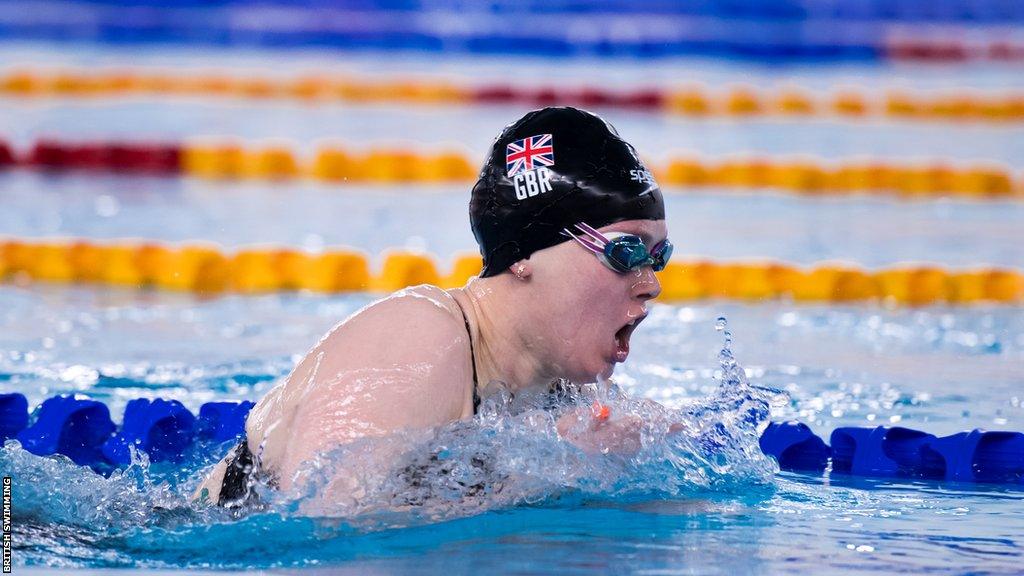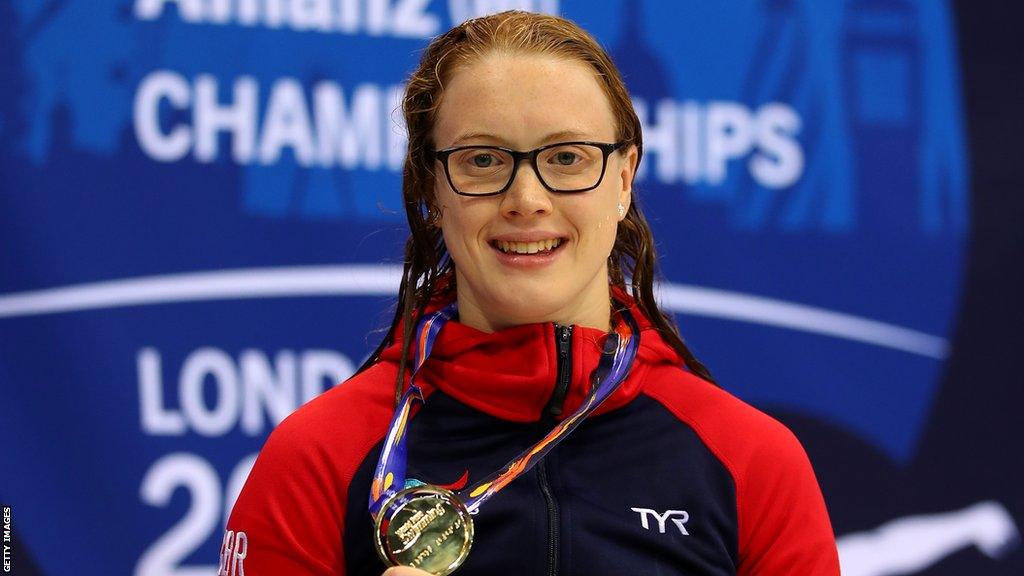Brock Whiston on why missing Tokyo Paralympics 'made me stronger'
- Published

Brock Whiston has competed at three World Championships over her career
2024 British Swimming Championships |
|---|
Dates: 2-7 April Venue: London Aquatics Centre Time: Heats from 10:00 BST in morning session. Finals session from 19:00 |
Coverage: Finals sessions streamed live on BBC iPlayer & BBC Sport website and app. Daily reports on BBC Sport website |
After missing the Tokyo Paralympics, Para-swimmer Brock Whiston says she wants to put the tough times behind her and secure her place at the Paris Games.
The 27-year-old goes in this week's British Swimming Championships at the London Aquatics Centre - a special venue for her - hoping for performances to put her in line for selection.
Not only does Whiston do one of her weekly training sessions in the pool, back in 2019 she made her Great Britain debut there at the World Para Swimming Championships, bursting on to the scene by winning golds in the 100m breaststroke and 200m medley - both in world record times - and helping GB to two relay titles.
Issues around her eligibility and category meant the Londoner was unable to compete in the Tokyo Paralympics in 2021 and the 2022 Commonwealth Games in Birmingham.
"I couldn't even watch the Games on television," she said. "I considered giving up but I love swimming and the challenge.
"It has made me a stronger athlete and more determined to get the qualifying times and go to Paris to thank all of those who supported me on the way.
"If it had been an easy journey it wouldn't have made me who I am."
Dispelling the 'lazy' myth
As a youngster, Whiston was frequently accused of being 'lazy'.
She struggled with her co-ordination, crawling with just her right leg while her left leg dragged and she would trip over it when she was tired.
As she got older she started to struggle more with her physicality and also suffered frequent shoulder dislocations, puzzling doctors before eventually being diagnosed with hemiplegia - which causes weakness and paralysis - on her left-hand side.
"It was a relief when someone finally explained why I was finding some things hard," she says.
"As you are growing, you can compensate for things - and that is what I did - but it is harder to adapt as you get older."
The dislocations still happen on a regular basis - with one even occurring during one of Whiston's finals at last year's World Championships in Manchester.

Whiston enjoyed gold-medal success on home soil in 2019
"It happens in most of my training sessions, I could be lying-in, watching television, and it will happen," she explains.
"My mum knows how to put it back in place now, so do I, so does my boyfriend and my coach. Sometimes it just will keep sliding in and out, it depends how fatigued I am.
"Everyone on the British team knows I love napping and can do three or four hours at a time. But that is what I need to be able to perform in the pool.
"At one point I considered having my arm amputated but I was told that was too dangerous an operation.
"Doctors also tried to fix it in place but when they put the shoulder in the position it should be in, it caused me so much pain that I couldn't cope."
Classification challenges
Swimming was always part of Whiston's life and she took part in non-disabled competition throughout her younger years.
Back in 2012, she was among the crowds at the London Paralympics, cheering on Ellie Simmonds to gold before she realised that she too could follow in Simmonds' footsteps as a Para-swimmer. She obtained her international classification in 2018.
Her coach, Stewart Nicklin at the Barking and Dagenham club, has been key to her success and they are constantly learning from each other to get the best results.
"We work hard together - sometimes when I think I can't do it, he just tells me to get on with it," she says.
"There are times when my hands won't work properly at the end of a session and I am exhausted, and my coach has to take my goggles and hat off and give me my drinks bottle."
Whiston started her career in the S8 category before being moved to the S9 category, where she competed against less-impaired rivals. After going through classification again earlier this year, she is back as an S8., external
Despite the changes, she says she remains focused on her own race and performance and starts her bid for Paris with the 400m freestyle on Friday, the 100m butterfly and 200m medley on Saturday and the 100m breaststroke and 100m freestyle on Sunday.
"There are some greats in both categories but at the end of day you are just there to do what you can do and race your own race," she says.
"Classification is done on observation and what the classifiers perceive you to be, and you are scored in and out of the pool.
"People can agree with it or disagree with it but it is the system. There will always be a variation of impairments within a class but you just have to get on with it and be grateful that you are in a position where you can still swim."

Who are the new Posh & Becks? Join Lily Allen and Miquita Oliver for your weekly dose of unfiltered chit chat!
A dying plea to 'find the real killers': Annette Hewins was wrongly accused of arson with the intent to endanger life
